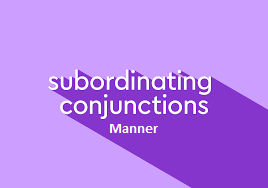News & Events
Subordinating Conjunctions (Manner)
- 19 August 2023
- Posted by: admin-rashtielts
- Category: Grammar

Subordinating Conjunctions
(Manner)
Subordinate clauses starting with the subordinating conjunctions of manner are called adverb clauses of manner. An adverbial clause, also known as an adverb clause, is a group of words that forms a dependent clause and acts as an adverb in a sentence. Adverbial clauses contain a subject, a predicate, and a subordinating conjunction. As with other adverbs, adverbial clauses modify an adjective, a verb, or another adverb.
There are several different types of adverbial clauses, each with its own set of common conjunctions and functions. We are focusing on one type only in this paper:
Adverbial Clause of Manner:
These adverbial clauses often use “as”, “like”, “as if” and “as though” to explain how something is done.
1. As:
As is used to show how something is done
- He behaves as he does, because his mother was totally cruel to him.
- The bricks are still made as they were in Roman Times.
You can use just, exactly and precisely in front of as for emphasis.
For example :
- I like the freedom to plan my day exactly as I want.
2. As if / as though:
As if / as though are used to show that the information might not be correct
- She reacted as if she didn’t know who stole the ring.
- She acts as though she is the boss.
After as if or as though, we often use a past tense to emphasize that the information is not true.
- He looked at me as though I were mad.
3. Like:
Like is used in informal speech to show how someone feels, looks or sounds.
- You look like you’ve seen a ghost.
- He talks just like his father does.
You can also use like in prepositional phrase to say how someone does something.
- He was sleeping like a baby.
Javidan Language Centre
www.rashtielts.ir
